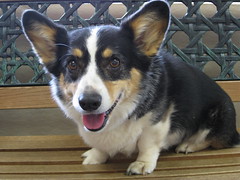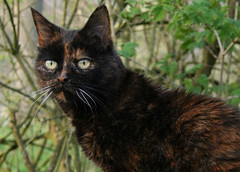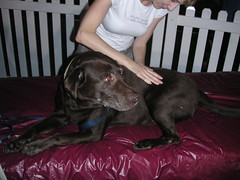Dementia and anxiety in your older dog – What you can do.
Monday, February 1st, 2010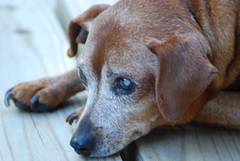 It is sad to see our beloved animal companions get old and even harder to see them start to loss their mind. In many dogs the first sign of this is anxiety in the evening or throughout the night, although dementia or cognitive dysfunction syndrome can manifest in many different ways.
It is sad to see our beloved animal companions get old and even harder to see them start to loss their mind. In many dogs the first sign of this is anxiety in the evening or throughout the night, although dementia or cognitive dysfunction syndrome can manifest in many different ways.
Not all dementia has an anxiety component to it and not all anxiety in older dogs is from dementia but the two often go together.
So what causes dementia in older dogs?
There are four main causes of dementia or cognitive dysfunction syndrome.
- Free radical formation Free radicals harm healthy cells in the brain.
- Hypoxia to the brain In other words there is not enough blood getting to the brain.
- Alterations in neurotransmitters There is too much or not enough of certain necessary neurotransmitters in the brain. You need neurotransmitters to have your neurons or brain cells function together.
- Neural infiltrates such as B amyloid and lipofusion These infiltrates destroy healthy brain tissue, similar to alzheimer’s disease in people.
In Traditional Chinese medicine (or TCM), anxiety in older animals is caused by too much heart fire related to the kidneys becoming deficient as your dog ages. Kidneys are considered to be the water element and as we age the kidneys get deficient and water in the body system decreases to a point that it allows heart which is a fire element to flare too much and cause anxiety especially during the heart peak hours of 11pm – 1am.
 According to TCM, another issue is that older animals can become what is called yin deficient. Yin holds the yang at night so we can sleep. If there is not enough yin, the yang is not held and sleep doesn’t happen.
According to TCM, another issue is that older animals can become what is called yin deficient. Yin holds the yang at night so we can sleep. If there is not enough yin, the yang is not held and sleep doesn’t happen.
Sometimes these problems are reversible if caught early but even when they are not, there are things you can do to help slow down the progression of the disease and help with symptoms. Usually in spite of everything we do, dementia is progressive and eventually gets to the point that nothing helps anymore. This process can happen quickly or occur slowly over a number of years.
Here is a list of some things that I have found can help your older dog with dementia or anxiety. Please check with your veterinarian to come up with a plan that is safe for your dog.
- Walking is the most important thing you can do for your older dog. Walking just ten minutes twice a day can significantly increase brain blood flow and reverse symptoms of dementia from hypoxia. Plus it can help prevent muscle atrophy and help with arthritis.
- Ginkgo Biloba
does three important things. It helps increase blood flow to the brain by vasodilation , it helps regulate dopamine in the brain and it helps prevent amyloid deposits. I dose ginkgo at 100mg per 50lb of dog or more. I sell a powdered herbal formula called Brain and Heart Support Formula through my etsy store Kingdom of Basil which can be added to food. In animals with picky appetite you can also use the Animals’ Apawthecary Hawthorn Plus
which contains hawthorn and ginkgo. Another option is to use the product Senilife
which contains ginkgo and other antioxidant ingredients (see Peggy’s comment in the comments section). I find ginkgo can help slow the progression of dementia - Fish or Cod Liver Oil and other antioxidants help prevent and repair free radical damage and stimulate brain function. In addition Fish Oil also help with arthritis and dry coat problems in older dogs. I dose Fish Oil at 500mg per 40 lb of dog. I prefer the Nordic Natural Cod Liver Oil.
Extra vitamin B and E can also help these dogs.
- SamE helps increase dopamine function in the brain, stimulates brain function and works as an antioxidant. It also helps with joint pain and liver function which many older dogs have problems with. I dose SamE at around 425mg per 50lb of dog. I prefer to use the dog product Nutramax Denosyl
.
- Remove any compact fluorescent or fluorescent lighting. Fluorescent lighting can cause a high pitched hum that humans can not hear but dogs and cats can. Older dogs loss their high frequency hearing last so even almost deaf dogs can still hear very high frequency noises. In addition fluorescent lighting can affect brain function and can cause headaches. See The danger of compact fluorescent lighting.
- Get rid of the dry food. Many older dogs do better on home cooked food or canned food. I don’t recommend switching an old dog to raw food if they have not been on it before. From a Chinese medicine view, dry food is too processed and dry for an older dog who already is kidney deficient.
- 5.Wearing a T-shirt, Thundershirt
, or Anxiety Wrap can help your older dog if they have problems with anxiety. It sounds weird I know, but it actually does work.
It is based around the ideas from Tellington TTouch of using an ace bandage. See the article Put an ace bandage on my dog?. Wearing the shirt enhances your dog’s sense of their own body and makes them feel more confident in their movements and behavior. You can use a snug fitting human T-shirt, a Thundershirt
, or an anxiety wrap. I have found however that if your dog has a lot of arthritic pain the anxiety wrap is too hard to put on, so try the Thundershirt or a T-shirt in that case. This is also an idea that can work in young dogs with anxiety.
- Melatonin can help old dogs sleep at night. Sometimes older dogs can get confused between night and day and end up sleeping all day and then pacing and panting at night. This can make it very hard for us humans to sleep also. Giving Melatonin in the evening can help regulate night and day for these guys and get everyone a better night’s sleep. I dose Melatonin at 3-4mg per 50lb of dog.Many brands of Melatonin contains xylitol which is highly toxic to dogs. Make sure your brand does not!
- Small meals more often and right before bed are sometimes better for these older dogs. A small meal of wet or cooked food right before bedtime can help get these dogs through the night and help them sleep better.
- Acupuncture can help decrease anxiety especially at night time by treating the yin, kidneys, and heart fire. In addition acupuncture can help with arthritis pain, weakness, and kidney function and help your dog age more gracefully as they get older. I often combine acupuncture with Chinese herbs for these dogs.
- Reiki can help to relax older dogs and calm anxiety. Reiki is a nice calming way of helping improve health and well being as animals age.
- Bach Rescue Remedy
and other flower essences can help with anxiety and fear. Flower essences are homeopathic in nature and very safe for older animals. Rescue Remedy is the best know but there are many lines for treating a variety of behavior and emotional issues.
You can dose flower essences by putting 3-4 drops in your dog’s drinking water every time you change their water. It’s ok to use flower essences in the water even if other animals drink from the same dish.
- Other herbal medications are out there for helping with anxiety in older dogs.
Making a tea or tincture
from hops leaves can help calm some older dogs. You can also buy hops leaves and sprinkle them in your dog’s food. Animal Apawthecary makes a Tranquility Tonic
that if used at their recommended dosage is safe in most animals. I also have a formula I make and sell in my store, Kingdom of Basil, which helps to treat anxiety in older dogs and also contains ginkgo to help with brain function called Calm and Peaceful Formula. Also see my article Helping anxiety in an old friend – calm and peaceful formula.
I recommend consulting with a holistic veterinary to decide on what is right for your dog.
Some of the calming herbals can be dangerous if used incorrectly or in the wrong animal.
To use Chinese herbs correctly you should consult with a veterinarian with a background is Chinese herbal medicine or Traditional Chinese Medicine.
- Western Drugs are always an option. There are may drugs that help with anxiety and can be given if the natural alternatives do not work or are not enough. There are also drugs out there that help with dementia such as Selegiline (Anipryl). Most of the western drugs like the herbs are not cure alls but can help make things better.
- Some dogs are anxious because they are painful . This is an important thing to rule out before assuming there is a dementia component.
If your dog is not on pain medication have them evaluated by your veterinarian. If they are on pain medication talk to your vet about increasing the dose or trying something else if there may be a pain factor. Dogs can’t always tell us when they are in pain and pain certainly can cause sleep disturbance and anxiety.
- Talk to your dog about the change in their position in the house. Many dogs especially the herding breeds take their job of watching the house very seriously. As they get older and can not do it the way they would like to anymore they can become quite anxious. Explaining that your accept them in their old age and making changes to help them, can ease anxiety. See the article Love me for who I am today.
- 13. Take care of yourself!. This is very important when you are caring for an elderly or sick animal. To be a good caregiver you need to be healthy and well rested.
If you have a dog that is anxious at night and you are not sleeping consider putting them in a different room than you sleep in, crating them if they are ok with crating, or finding another solution. If you get sick because you are not taking care of yourself you will not be able to care for them.
It may seem mean to kick them out of your room but it is kinder than letting them sleep with you and being a grumpy caregiver. I had to do this with my old dog Jake and it actually ended up with us both sleeping better. Before we slept in separate rooms, his anxiety made me anxious, which made him more anxious and by the morning we were both a mess.

One of my patients, Luna wearing a T shirt
Dementia and anxiety are some of the most frustrating and painful problems I see in older dogs and can be very difficult to deal with. Be gentle on yourself and your dog companion and try to find a healthy way to work with these problems for everyone in the household.
When dementia progresses to a point where you beloved companion is no longer present and enjoying life or in pain sometimes the greatest gift we can give them is to help them to go through euthanasia. This is not an easy decision to make and there are no set guilds that tell you when it is time. This can differ from dog to dog. The best we can do is to look into our hearts for what is right.
Also see Follow up to Dementia and Anxiety in Older Dogs – Sadie’s Hospice Care.
Please join me in the Path With Paws forums for more discussion of dementia and with any questions.
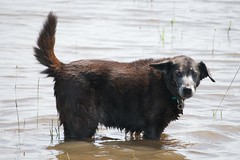
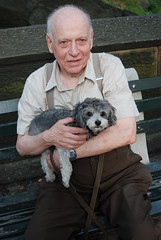
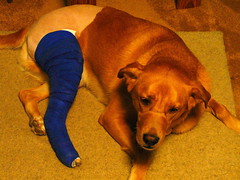
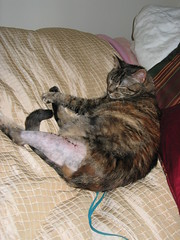
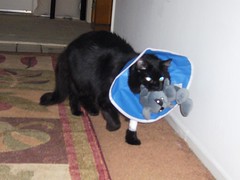
 My friend Rose just emailed to let me know that she still has openings in her Level 1 Reiki class offered on September 11 and 12th. Rose is an incredible reiki practitioner and has worked on three of my cats, one of my dogs and me. I always was a little skeptical about reiki before meeting Rose, not because I didn’t believe in energy work but because I had meet some practitioners who I wouldn’t want anywhere near me or my patients. Rose changed my mind about all of that.
My friend Rose just emailed to let me know that she still has openings in her Level 1 Reiki class offered on September 11 and 12th. Rose is an incredible reiki practitioner and has worked on three of my cats, one of my dogs and me. I always was a little skeptical about reiki before meeting Rose, not because I didn’t believe in energy work but because I had meet some practitioners who I wouldn’t want anywhere near me or my patients. Rose changed my mind about all of that.